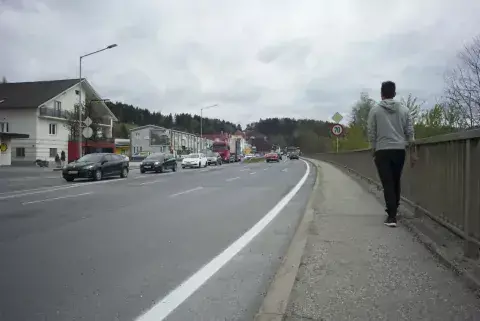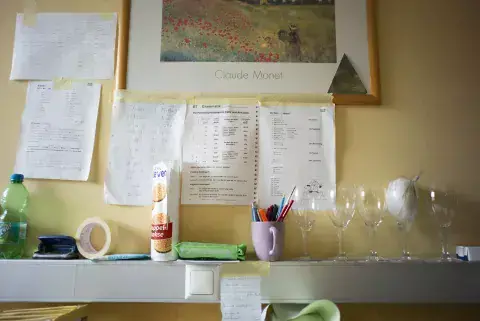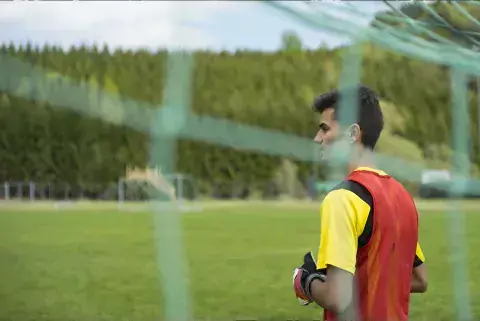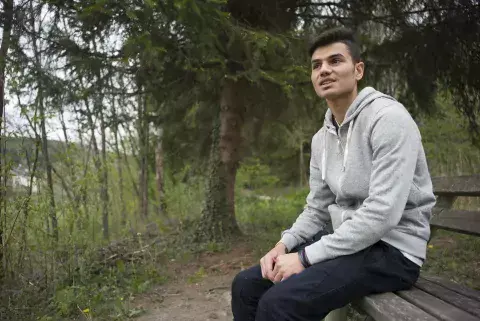Ali's Story

Beyond the city of Rosental an der Kainach, past the shopping centre, the local fire brigade and football pitch is a quiet forest Ali visits periodically for reprieve from the suffocating boredom and worry of his small apartment. Further along the path, the dense trees and cool, moist soil of the forest muffle the sound of passing cars on the motorway until they are barely audible. This is where Ali can find the peace to think.

Ali walks along the A70 highway through Rosental an der Kainach. He takes walks periodically to relieve the headaches he gets from being cooped up in his small apartment.
“We make everything complicated. In the forest, it’s not so complicated. Here, you can cry or shout if you want to. Here you can really think.”
Ali is an asylum seeker from Afghanistan living in Rosental, a small city up the valley from the southern Austrian city of Graz. Ali came to Austria from Iran, where he had been living since he fled the Taliban, which is still present in his home village. However, he had to leave Iran, where he had a steady job as a plasterer, but it was not safe for him in to return home so he looked to Europe.
He lives in a small, one-room flat that he shares with another asylum seeker. His otherwise orderly room is overflowing with books, handouts, flashcards, sticky notes, pens, declension tables and posters – all of which aid him, in one way or another in mastering the German language.

Sunlight trickles in through his window onto his desk where he spends most of his abundant free time learning German. The power has gone out.
Ali spends most of his time in his room studying German, living a disciplined life of routine: wake, eat, study, walk, exercise, study, sleep, punctuated by football, visiting friends and German class.
Before Ali came to Austria, he couldn’t write Latin script, but in just 18 months has made tremendous progress and is reaping the benefits, as he can now freely interact with his community and other asylum seekers. Language acquisition has offered him independence as well as a gateway into his new Austrian community.
“Before, I couldn’t do anything. It was so boring. I wanted to write, I wanted to talk, but I couldn’t. That was really bad, but now I’m really inspired. Things are easier. When I could speak some German, I could talk to more people. I could do things for myself.”
He’s gotten a lot of support from his Austrian friends, and learned how things work, how to apply for jobs and about Austrian norms and culture. He has also been able to share his own life and experiences and stories about his home.
“I feel a lot better now,” he says. “I’m not so alone. It makes a big difference. Without a German course, what could I do?”
Ali has also picked up football, and now plays on a team of mixed asylum seekers and Austrians. Playing football also given him another window into understanding Austrian culture and fitting in with his peers. In his hometown, he wasn’t even allowed to own a ball because of the strict rules in place by the Taliban.
“When one plays football, one can learn how the people here play and what they talk about, what’s going on, and can learn how people on a team live and how they’ve become friends. That’s also good.”

Ali stands in the goal during a weekend practice match. Ali plays football a few times a week and is quickly learning the ins and outs of what he calls, “Austria’s national game.”
“How could I play on a team if I can’t speak German?” he smiles. “I make a lot of mistakes in the goal, but nobody says anything.”
This experience is vital to him.
“I realised that we can live and play with all kinds of people. The Austrians live together and can live with all people.”

“I like it here in Austria because we have freedom. For example, I’m a Muslim, and he’s a Christian. We can live like two brothers. I think that’s really good. People can sit together, speak together, share their opinions. We can’t speak our mind in Afghanistan.”
He has had his rough patches of discrimination, confusion and loneliness, but he is happy to be in Austria, and can’t imagine a life anywhere else. His status in the country is still tentative because his initial application for asylum was rejected and this insecurity that troubles him daily. However, he still looks forward to happier times.
“I don’t feel so good because of my application, but it will get better. I think I must always improve myself, and I’m always trying.”